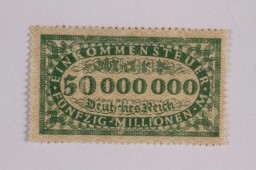You searched for: %EC%95%84%EB%93%9C%EB%A0%88%EB%8B%8C%EC%B2%98%EB%B0%A9%E2%99%A8t789.top%E2%99%A8%ED%94%84%EB%A6%B4%EB%A6%AC%EC%A7%80%EC%A7%81%EA%B5%AC%E2%99%A8%EB%B9%84%EC%95%84%EA%B7%B8%EB%9D%BC%ED%8C%8C%EB%8A%94%EA%B3%B3%E2%99%A8%EB%B9%84%EC%95%84%EA%B7%B8%EB%9D%BC%ED%8C%90%EB%A7%A4%E2%99%A8oiEo
<< Previous | Displaying results 176-200 of 286 for "%EC%95%84%EB%93%9C%EB%A0%88%EB%8B%8C%EC%B2%98%EB%B0%A9%E2%99%A8t789.top%E2%99%A8%ED%94%84%EB%A6%B4%EB%A6%AC%EC%A7%80%EC%A7%81%EA%B5%AC%E2%99%A8%EB%B9%84%EC%95%84%EA%B7%B8%EB%9D%BC%ED%8C%8C%EB%8A%94%EA%B3%B3%E2%99%A8%EB%B9%84%EC%95%84%EA%B7%B8%EB%9D%BC%ED%8C%90%EB%A7%A4%E2%99%A8oiEo" | Next >>
-
William Denson describes postwar trials of concentration camp personnel
Oral HistoryWilliam Denson graduated from the US Military Academy at West Point in 1934 and attended Harvard Law School. He returned to West Point to teach law from 1942 until 1945. In January 1945, Denson accepted the position of Judge Advocate General (JAG) in Europe and was assigned to US Third Army headquarters in Germany. He took part in more than 90 trials against Germans who had committed atrocities against downed American pilots. In August 1945, Denson became chief prosecutor for the US government at the…
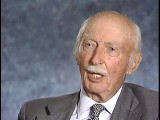
-
William Denson describes counsel provided to accused war criminals
Oral HistoryWilliam Denson graduated from the US Military Academy at West Point in 1934 and attended Harvard Law School. He returned to West Point to teach law from 1942 until 1945. In January 1945, Denson accepted the position of Judge Advocate General (JAG) in Europe and was assigned to US Third Army headquarters in Germany. He took part in more than 90 trials against Germans who had committed atrocities against downed American pilots. In August 1945, Denson became chief prosecutor for the US government at the…
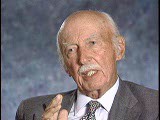
-
William Denson describes finding witnesses for the postwar trials of concentration camp personnel
Oral HistoryWilliam Denson graduated from the US Military Academy at West Point in 1934 and attended Harvard Law School. He returned to West Point to teach law from 1942 until 1945. In January 1945, Denson accepted the position of Judge Advocate General (JAG) in Europe and was assigned to US Third Army headquarters in Germany. He took part in more than 90 trials against Germans who had committed atrocities against downed American pilots. In August 1945, Denson became chief prosecutor for the US government at the…
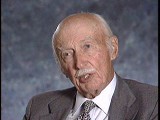
-
Fürstengrube
ArticleLearn about Fürstengrube subcamp of Auschwitz, including its establishment, administration, prisoner population, and forced labor and conditions in the camp.
-
The Search for Perpetrators
ArticleThousands of Nazi criminals were never arrested. Learn more about the postwar efforts to bring Nazi perpetrators to justice.
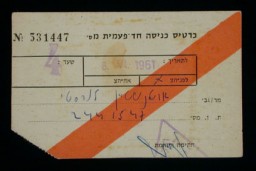
-
Melk
ArticleLearn about the establishment of and conditions in Melk, a subcamp of the Mauthausen camp system in Austria.
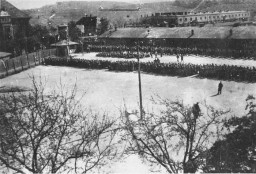
-
Westerbork
ArticleThe Westerbork transit camp, located in the German-occupied Netherlands, served as a temporary collection point for Jews in the Netherlands before deportation.
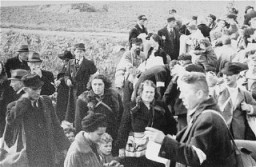
-
Jeno Muhlrad
ID CardJeno was the youngest of five children born to Jewish parents living in a suburb of Budapest. His father was a wholesale merchant who sold beer to restaurants and stores. After receiving a university diploma, Jeno became a pharmacist. He and his wife, Aranka, and their two children, Eva and Andras, shared a large old house in Ujpest with Jeno's father and other members of the extended family. 1933-39: Jeno's friends and family have helped him raise the large amount of money he needs to lease his own…
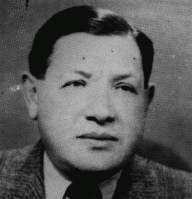
-
Dora Unger
ID CardDora, her parents, brother, aunt, uncle, and two cousins lived together in her grandfather's home in Essen, Germany. The Ungers were an observant Jewish family, and when Dora was 8, she began to regularly attend meetings of Brit HaNoar, a religious youth organization. 1933-39: In October 1938 a teacher, with tears in her eyes, came to Dora at the municipal pool, saying "Jews cannot swim here anymore." Just weeks later, on November 9, Jews were arrested and their property destroyed. A neighbor tried to…
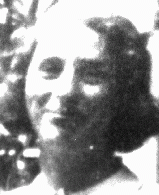
-
Jeno Nemeth
ID CardJeno moved to Szentes from a tiny farming community near the city of Szolnok, where he and his two brothers had been born to Jewish parents. Jeno owned a store that carried groceries and hardware items. He lived in the southeast Hungarian town of Szentes. Jeno and his wife, Juliana, had two married daughters, Barbara and Margit. Their son, Desider, was a dentist in Szentes. 1933-39: Jeno and his wife work hard in their store. The Depression of the 1930s was devastating, but things are starting to get a…
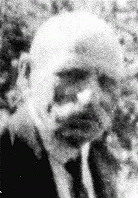
-
Ravensbrück
ArticleLearn about conditions and the treatment of prisoners in Ravensbrück, the largest concentration camp for women in the German Reich.
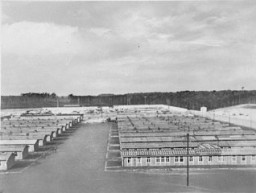
-
Collaboration
ArticleTo perpetrate the Holocaust, Nazi Germany relied on the help of allies and collaborators from across Europe, including governments, institutions, and individuals.
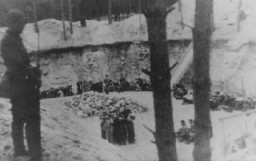
-
Hidden Children: Hardships
ArticleParents, children, and rescuers faced daunting challenges once the decision was made for a child to go into hiding during the Holocaust.
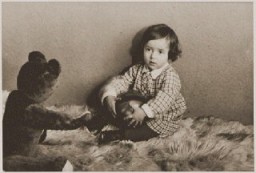
-
Klaus Barbie: The Butcher of Lyon
ArticleKlaus Barbie, chief of the Gestapo in Lyon, France, was nicknamed the "Butcher of Lyon" for his brutal actions towards Jews and members of the French Resistance.
-
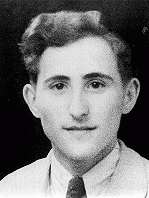
-
Concentration Camp System: In Depth
ArticleThe Nazi regime's extensive camp system included concentration camps, forced-labor camps, prisoner-of-war camps, transit camps, and killing centers.
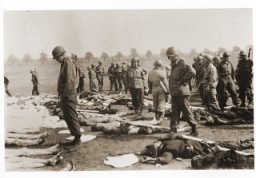
-
Felix Horn describes a hiding place in Warsaw
Oral HistoryFelix was born to an assimilated Jewish family in Lublin, Poland. His father was a locksmith and his mother was a singer. Following the German invasion of Poland on September 1, 1939, Felix fled east to Rovno and then to Soviet-occupied Lvov, where he was accepted at a medical school. After the German invasion of the Soviet Union in June 1941, Felix was taken to a labor camp. He escaped and returned to Lublin, and found that his family had been forced into the ghetto established there. After the…
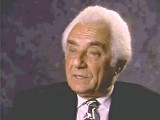
-
The Immigration of Refugee Children to the United States
ArticleMore than one thousand unaccompanied refugee children fleeing Nazi persecution arrived in the United States between 1933 and 1945. Learn more
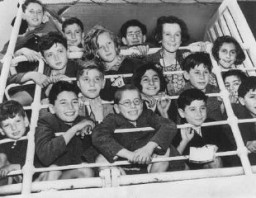
-
Selma (Wijnberg) Engel describes deportation to Sobibor
Oral HistorySelma was the youngest of four children born to Jewish parents. When she was 7, Selma and her family moved to the town of Zwolle where her parents ran a small hotel. When the Germans invaded the Netherlands in 1940, they confiscated the hotel. The family had to live in a poor Jewish section of the town. Selma went into hiding but was betrayed and then sent to the Westerbork camp. In April 1943 she was deported to Sobibor, where she worked in the clothes sorting area. There, the prisoners tried to pocket…
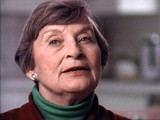
-
Leon Rupnik
ArticleDuring World War II, Slovene general Leon Rupnik collaborated with the forces of Fascist Italy and Nazi Germany. Rupnik was appointed president of the Provincial Government of the German-occupied Province of Ljubljana in 1943. He was convicted of treason and executed in 1946. In 2020, his sentence was annulled on a technicality.
-
William Denson describes the nature of the evidence uncovered for postwar trials of concentration camp personnel
Oral HistoryWilliam Denson graduated from the US Military Academy at West Point in 1934 and attended Harvard Law School. He returned to West Point to teach law from 1942 until 1945. In January 1945, Denson accepted the position of Judge Advocate General (JAG) in Europe and was assigned to US Third Army headquarters in Germany. He took part in more than 90 trials against Germans who had committed atrocities against downed American pilots. In August 1945, Denson became chief prosecutor for the US government at the…
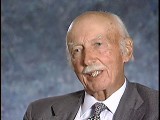
-
The Aftermath of the Holocaust
Animated MapView an animated map describing some of the challenges survivors faced in the aftermath of the Holocaust, when many feared returning to their former homes.
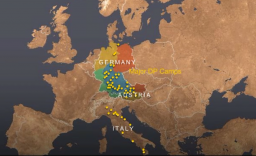
-
Halle
ArticleHalle an der Saale was a satellite camp of Buchenwald concentration camp. It was established by the Nazis in Saxony, Germany in 1941.
-
Sobibor
ArticleTo carry out the mass murder of Europe's Jews, the Nazis established killing centers that used assembly-line methods of murder. Sobibor was among these facilities.
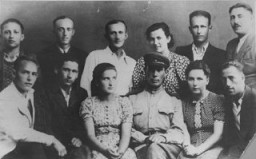
-
The Weimar Republic
ArticleThe Weimar Republic was a liberal democratic republic founded in Germany in the aftermath of WWI. Learn about the era’s political and economic crises and social trends.
